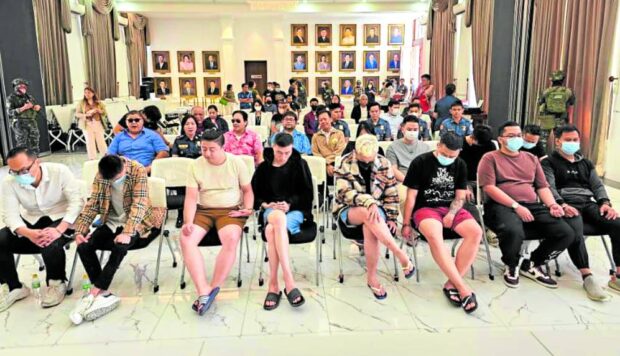
‘CYBER-ENABLED’ SCAM The dozen foreign nationals who allegedly maintained a Pampanga-based company used for human trafficking and online financial scams are presented for inquest at the Department of Justice on Saturday. —PNP-ACG PHOTO
MANILA, Philippines — The more than a thousand workers, mostly other Asian nationals, rescued by authorities at Clark Freeport Zone in Pampanga province just wanted to have decent jobs and send money back to their families, not knowing they would be preyed upon by human traffickers.
From Wednesday to Thursday last week, operatives of the Philippine National Police-Anti-Cybercrime Group (ACG) raided the six five-story buildings of Colorful and Leap Group, a company operating from Clark Sun Valley Hub, on Jose Abad Santos Avenue, Mabalacat City.
A total of 1,090 individuals —389 Vietnamese, 307 Chinese, 171 Filipinos, 143 Indonesians, 40 Nepalese, 25 Malaysians, seven Burmese, five Thai, two Taiwanese and one from Hong Kong—were “rescued” and listed as victims of human trafficking.
The ACG said they were forced into working at least 18 hours a day in a “fraudulent cyber-enabled industry” that used fake investments and cryptocurrencies as bait.
Formal complaints were filed at the Department of Justice (DOJ) on Saturday against 12 “maintainers” of the company, according to ACG spokesperson Capt. Michelle Sabino. The 12 consisted of seven Chinese nationals, four Indonesians and one Malaysian.
‘Pig butchering’
The workers were made to help perpetrate a romance scam called “pig butchering,’’ which the ACG said had been perfected by Chinese criminal syndicates. The name comes from the idea of the scammers “fattening up” their prospective victims with flattery and fake intimacy, before stealing their money. In a radio interview on Saturday, Sabino said the workers’ daily task involved finding targets through dating apps, such as Tinder and Facebook Dating. Those so far interviewed by the ACG said they each needed to “engage” up to 20 prospects during a shift, with some targets based in the United States, Canada and European countries.
Two schemes were mainly used: one involves hooking the targets on messaging apps, such as Whatsapp, convincing them to put money in high-interest, low-risk, Ponzi-like investments.
“(The victims) will really earn much in the first few weeks,’’ Sabino said. “This makes (the scammers) gain the trust of their victim, who would then invest more money. But later on the victims won’t be able to withdraw their money, and they would be ghosted.”
For a ‘future’ together
The other scheme calls for more intimate interactions to the point that the victims would “fall in love” with the scammers, who would later ask them to make investments “as part of their future” as a couple.
“When you’re in love, you’ll do anything that your lover asks you to do. So the workers tell their victims that they need to buy houses or cars, as part of building their future together,” Sabino said. “At first, it looks good, because it’s a 50-50 shared investment. The victims would then give their 50-percent share, while the worker would show a platform showing that they also paid half of the share.
“But in actuality, the worker did not invest. It’s all fake and a scam,” she added.
The workers were hired through online job postings, mostly on Facebook, Telegram and WhatsApp, according to Sabino. “They have easy requirements. One just needs to be 18 years old and above, knows how to write and talk in English, and knows how to use online and social media applications. Their training only lasts for five to six days,” Sabino said.
Applicants were promised a monthly base salary of $1,500 to $2,000, depending on their fluency in English or Chinese.
To be more convincing, the recruiter would shoulder the workers’ plane tickets and visa application fees (including an upgrade from tourist to working visa), plus food and accommodation upon arrival in the country.
The recruits were mostly university-educated and primed for white-collar jobs requiring social media skills.
“They thought they were into typical online jobs,” Sabino said. “But once they’re here and already employed, it is very difficult for them to back out since they have already invested much of their time and money.”
PH as scam hub host
Last month, Sen. Risa Hontiveros raised the alarm about the country increasingly becoming a host of online scam hubs run using trafficked foreign nationals.
Hontiveros noted that while scam hubs in other Southeast and South Asian countries operated in remote areas to avoid detection, those in the Philippines had been brazen enough to set up in urban centers and large condominium buildings.
According to Global Anti-Scam Org, a nonprofit established by an online scam victim herself, pig-butchering rackets employing Southeast Asians can be traceable to Chinese telecom fraud and illegal gambling schemes targeting mainland Chinese.
The Chinese government started cracking down on such activities in 2021, but the operators were able relocate to Cambodia, Laos, Malaysia, Indonesia and the Philippines, while their range of victims also expanded to include non-Chinese speakers.